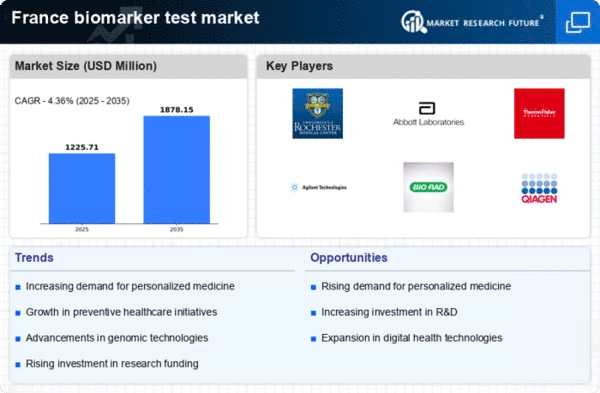Regulatory Framework Enhancements
The evolving regulatory framework in France is a significant driver for the biomarker test market. Recent reforms aimed at expediting the approval process for diagnostic tests are likely to facilitate quicker market entry for innovative biomarker solutions. The French regulatory authorities are increasingly recognizing the importance of biomarkers in personalized medicine, leading to more streamlined pathways for their validation and commercialization. This supportive regulatory environment is expected to encourage investment and innovation within the biomarker test market. As a result, stakeholders may find it easier to bring new tests to market, ultimately benefiting patients through improved diagnostic options.
Rising Prevalence of Chronic Diseases
The increasing incidence of chronic diseases in France is a pivotal driver for the biomarker test market. Conditions such as cancer, diabetes, and cardiovascular diseases are becoming more prevalent, necessitating advanced diagnostic tools. According to recent health statistics, chronic diseases account for approximately 80% of healthcare costs in France. This trend underscores the need for effective biomarker tests that can facilitate early detection and personalized treatment plans. As healthcare providers seek to improve patient outcomes, the demand for biomarker tests is expected to rise significantly. The biomarker test market is thus positioned to benefit from this growing need for innovative diagnostic solutions that can address the complexities of chronic disease management.
Investment in Research and Development
Investment in research and development (R&D) within the French healthcare sector is a crucial driver for the biomarker test market. The French government has been actively promoting R&D initiatives, allocating substantial funding to biotechnology and diagnostic research. In 2025, R&D spending in the healthcare sector is projected to reach €5 billion, reflecting a commitment to innovation. This financial support fosters the development of novel biomarker tests, enhancing their accuracy and reliability. As a result, the biomarker test market is likely to experience accelerated growth, driven by advancements in technology and the introduction of new testing methodologies that can improve patient care.
Technological Integration in Healthcare
The integration of advanced technologies in healthcare is reshaping the biomarker test market. Innovations such as artificial intelligence (AI) and machine learning are enhancing the capabilities of biomarker tests, allowing for more accurate and efficient diagnostics. In France, healthcare institutions are increasingly adopting these technologies to streamline testing processes and improve patient outcomes. The biomarker test market stands to benefit from this technological evolution, as it enables the development of sophisticated testing platforms that can analyze complex biological data. This trend suggests a promising future for the market, as technology continues to play a vital role in advancing diagnostic capabilities.
Growing Demand for Preventive Healthcare
The shift towards preventive healthcare in France is significantly influencing the biomarker test market. With an increasing awareness of health and wellness, patients and healthcare providers are prioritizing early detection and prevention strategies. This trend is reflected in the rising adoption of biomarker tests, which can identify potential health risks before they develop into serious conditions. The biomarker test market is likely to expand as more individuals seek proactive health management solutions. Furthermore, the French healthcare system is increasingly integrating preventive measures into its framework, further driving the demand for innovative biomarker testing solutions that align with this paradigm shift.
















